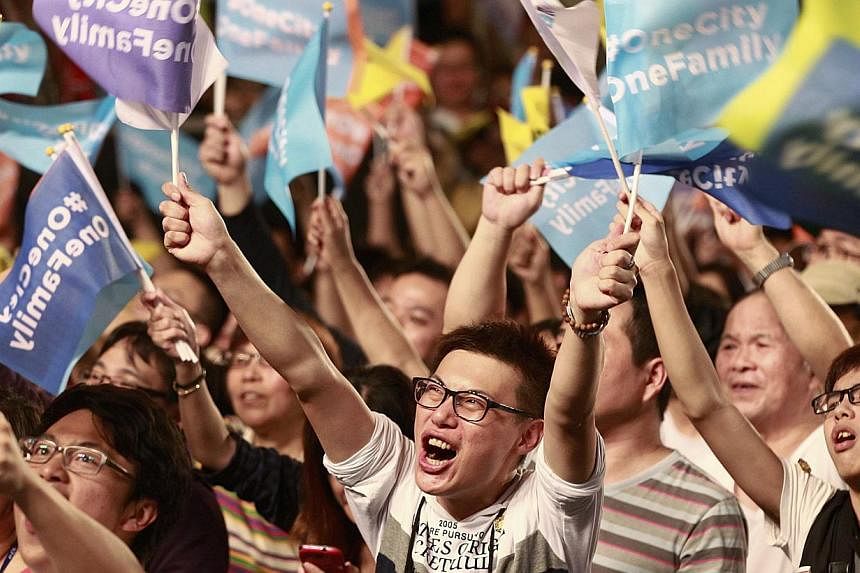TAIPEI (AFP/REUTERS) - Taiwan's Premier Jiang Yi-huah resigned on Saturday after the ruling Kuomintang (KMT) party suffered a landslide defeat at the island's biggest-ever local elections.
Mr Jiang announced that he had stepped down at a hastily called brief press conference, saying that he took "political responsibility" for the party's heavy losses - unofficial results showed the KMT had lost in five out of Taiwan's six municipalities.
"The public has not been satisfied with the government's performance, and that was reflected in the results of the vote. So I have decided to assume political responsibility and tendered my resignation, which has been approved by President Ma," he said.
Taiwan's President Ma Ying-jeou said on Saturday that the KMT had suffered a serious setback. The comments from came just hours after polls closed in a vote in which the KMT lost power in key cities.
Mr Ma has no plans to resign as KMT chairman, party spokesman Charles Chen said late on Saturday.
The KMT lost its two strongholds of Taipei, the capital, and Taichung, in central Taiwan, in the election for mayors and councillors at the local level islandwide.
Independent candidate Ko Wen-je took the KMT's traditional stronghold of Taipei, with his rival Sean Lien tearfully declaring defeat ahead of the official result. "I am very sorry that I didn't meet everybody's expectations. This is my personal responsibility and it's because I didn't work hard enough..." Mr Lien told his supporters, bowing deeply.
Incumbent KMT mayor Jason Hu in the party's other key stronghold of Taichung also conceded a loss to the DPP's Lin Chia-lung. "I thank many young people who came out to vote, you took part in history and you created history," Mr Lin said.
The opposition Democratic Progressive Party (DPP) declared a surprise victory in Taoyuan and retained its seats in Tainan and Kaohsiung - party spokesman Huang Di-ying told AFP that the party's performance was "beyond our expectations".
A record 11,130 seats at every level of local government are up for grabs, with 18 million people eligible to vote.
Turnout figures have not yet been confirmed but were expected to be 65 per cent to 75 per cent.
"Many young people are concerned about job prospects and high housing prices so I hope to see change and new thinking in the government to make things better for us," graduate student Mark Hsu told AFP outside a polling station in the capital.
Counting is still under way, with full official results expected around 11pm.
The race for the Taipei mayor's job had been widely interpreted as a test of confidence in Mr Ma Ying-jeou's China-friendly government.
The KMT is struggling with growing fears over Chinese influence, a slowing economy and a string of food scandals - the local polls are seen as a key test ahead of the 2016 presidential race, with China policy a key issue.
Embattled Mr Ma, who came to power in 2008 on a Beijing-friendly platform, must step down at the end of his second four-year term.
Taiwan and China split in 1949 at the end of a civil war, but Beijing still claims the island as part of its territory awaiting reunification, by force if necessary.
Mr Ma has overseen a marked improvement in previously frosty ties between Taipei and Beijing since he ended the DPP's eight-year rule in 2008 on a platform of boosting the economy and trade with China.
However, the public has grown increasingly anxious over China's influence on the island.
A proposed trade pact with the mainland sparked mass student-led protests and a three-week occupation of Taiwan's Parliament earlier this year.
The opposition DPP has traditionally been sceptical over closer ties with Beijing and has criticised the KMT for lack of transparency over trade deals with China.
Before the vote, the KMT dominated 15 of Taiwan's 22 cities and counties, while the DPP held seven.
Of the six larger municipalities - the most hotly contested seats - the KMT controlled three in the north and one in the centre, against the DPP's two in the south.
Around 60,000 policemen were mobilised across the island for the vote, the authorities said, with barbed-wire barricades outside the presidential office.
Taiwan has experienced sporadic election violence, with two high-profile shootings at election-eve campaign events in recent years.

